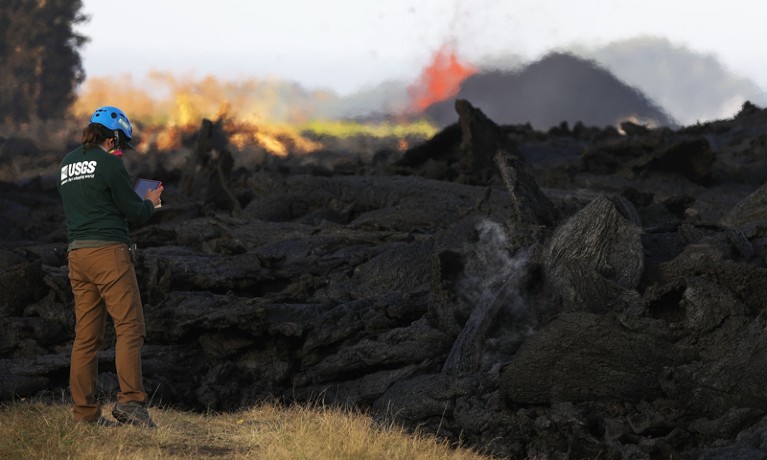
Nature is pleased to support efforts by Earth scientists to share their data.Credit: Mario Tama/Getty
Nature and Scientific Data are pleased to endorse the Enabling FAIR Data initiative in the Earth, space and environmental sciences. Funded by the Laura and John Arnold Foundation, and convened by the American Geophysical Union in partnership with the Earth Science Information Partners and the Research Data Alliance, this initiative brings together a network of stakeholders who, through advocacy, policies, infrastructure and services to support data sharing, are working together to facilitate a shift towards open data becoming the default in the Earth sciences. As such, from January 2019, we will require that authors of papers in Earth sciences (and related space and environmental science fields) make supporting data available to others through community repositories where available.
Where such repositories are not available, data sets may be put into general repositories such as figshare, Dryad or Zenodo. We will allow exceptions, for example to protect participant privacy, when authors do not own the rights to the data set or when publication would risk disclosing sites of ecologically sensitive samples. Initially, the policy will be implemented at Nature, followed by relevant Nature Research journals. Scientific Data will be updating its list of recommended data repositories to help authors from these fields to comply with these new policies.
Establishing data as primary outputs of research, to be shared, cited and credited in their own right, has been a central feature of the drive by Nature Research and Springer Nature to support reproducible research in our journals. A number of funders have made important strides in mandating data sharing, but barriers remain for researchers who face challenges such as finding the right repository, curating data sets so they can be reused, and a lack of standards for curation and incentives for sharing.
We have taken a number of steps to support and incentivize data sharing, from introducing standardized research-data policies and the Research Data Helpdesk, which provides free advice on research-data policies and data repositories, to launching Research Data Support, a paid data-curation service available to authors who have published in any journal. We have also created dedicated forums for data-focused publication, such as Scientific Data. This journal already enforces rigorous standards for data deposition, preservation and open sharing that align with many of the aims of the Enabling FAIR (findable, accessible, interoperable and reusable) Data initiative.
But policies, infrastructure and services only go so far. To make data sharing the norm, funders and institutions must shift incentives and recognize and reward data generation, curation and sharing in research assessment. Most of all, it will require researchers to embrace the benefits of data sharing for underlining the integrity and reproducibility of their work, and for the scholarly ecosystem of funders, publishers, repositories, institutions and societies to work in partnership. The Enabling FAIR Data project marks an important step in this collective journey.

 Google unveils search engine for open data
Google unveils search engine for open data
 China backs bold plan to tear down journal paywalls
China backs bold plan to tear down journal paywalls
 China’s crackdown on genetics breaches could deter data sharing
China’s crackdown on genetics breaches could deter data sharing




